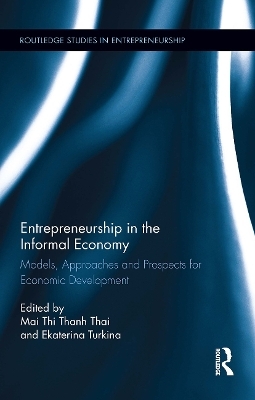
Entrepreneurship in the Informal Economy
Routledge (Verlag)
978-1-032-92371-0 (ISBN)
Although entrepreneurship in the informal economy occurs outside state regulatory systems, informal commercial activities account for an estimated 30% of economic activity around the world. Informal entrepreneurship goes unmonitored despite the fact that it significantly contributes to poverty reduction and economic development. As a result, the informal sector is open to unethical practices including corruption, worker exploitation, and natural environment abuse to name just a few. In the media, debates have formed around whether informal entrepreneurship should be assisted or legitimized. Hence, a deep understanding of the phenomenon is vitally important.
This book is the first on the market to offer models and approaches to informal entrepreneurship as well as to its prospects for economic development. Offering an in-depth examination of informal entrepreneurship in many different countries, it reveals the motivations for engaging in entrepreneurship in the informal economy, characteristics of informal entrepreneurship, and informal entrepreneurs’ response to ethical issues. This volume illustrates the relationship between formal and informal economies and the conditions for the benefits of informal entrepreneurship to outweigh its disadvantages. And finally, it gives recommendations about when and how the informal economy can be formalized, which sectors should be formalized, and which ones can remain informal. This book offers much-needed guidance for stakeholders involved in economic development programs and scholars and entrepreneurs interested in the field of informal entrepreneurship as it is developing around the globe.
Mai Thi Thanh Thai is Assistant Professor in the Department of International Business, HEC Montreal, Canada. Ekaterina Turkina is Assistant Professor in the Department of International Business, HEC Montreal, Canada.
Part 1: Determinants of Informal Entrepreneurship 1. Determinants of Informal Entrepreneurship: A Cross-Country Analysis Mai Thi Thanh Thai and Ekaterina Turkina 2. Informal versus Formal New Ventures: A Choice Analysis and Some Policy Implications Bernard Sinclair-Desgagné 3. Evaluating the Competing Explanations for Informal Entrepreneurship: Some Lessons from Brazil Colin C Williams and Youssef Youssef 4. Motivations of Entrepreneurs in the Informal Economy: Examples from Cambodia Scott A. Hipsher Part 2: Financial Aspects for Informal Entrepreneurship 5. Informal Venture Capital Investing in Emerging Asian Economies William Scheela, Edmundo Isidro and Thawatachai Jittrapanun 6. Alternative Financial Services: An Essential Tool for Informal Entrepreneurs Les Dlabay Part 3: Organizational Forms of Informal Entrepreneurship 7. Informal Online Entrepreneurship in South Korea Amanda Min Chung Han 8. Institutional Entrepreneurship in the Informal Economy: The Case of the Zambia National Marketeers Association Marcus Møller Larsen 9. Informal Entrepreneurs in Central America: A Labor of Love or Survival? Michael J. Pisani Part 4: Institutional Environment for Informal Entrepreneurship 10. Unbundling Institutional Reform: The Case of a Garment Cluster in Lima, Peru, 1988 – 2008 Matthew Bird 11. Tackling Informal Entrepreneurs: Tailoring Policy Measures to the Varieties of Informal Entrepreneurship Colin C. Williams Part 5: Socio-Cultural Contexts of Informal Entrepreneurship 12. The Feminine Paradigm of Entrepreneurship in the Informal Economy Marsha A. Tongel 13. Enterprise Education for Small Artisanal Businesses: A Case Study of Sokoban Wood Village, Ghana Bernard A. Obeng, Richard K. Blundel and Ahmed Agyapong 14. When Religion Meets Capitalism: A Study of the Role of Islam among North African Entrepreneurs in Montreal Jamel Stambouli and Sébastien Arcand Part 6: The Role of Informal Entrepreneurship in Economic Development 15. Informal Economy and Women Entrepreneurs: A Case Study of Senegal in Africa Alpha Ayandé 16. Enhancing Well-being at the Household Level: The Impact of Informal Economy Activity on Poverty Reduction in the Traditional Ankole Kingdom of S.W. Uganda Emmanuel Mutungi and Tony Ghaye Part 7: Concluding Remarks 17. Informal Economy Entrepreneurship and Policy Implications Léo-Paul Dana
| Erscheinungsdatum | 16.10.2024 |
|---|---|
| Reihe/Serie | Routledge Studies in Entrepreneurship |
| Zusatzinfo | 33 Illustrations, black and white |
| Verlagsort | London |
| Sprache | englisch |
| Maße | 152 x 229 mm |
| Gewicht | 557 g |
| Themenwelt | Mathematik / Informatik ► Mathematik ► Finanz- / Wirtschaftsmathematik |
| Wirtschaft ► Betriebswirtschaft / Management ► Marketing / Vertrieb | |
| Wirtschaft ► Betriebswirtschaft / Management ► Unternehmensführung / Management | |
| ISBN-10 | 1-032-92371-7 / 1032923717 |
| ISBN-13 | 978-1-032-92371-0 / 9781032923710 |
| Zustand | Neuware |
| Haben Sie eine Frage zum Produkt? |
aus dem Bereich


